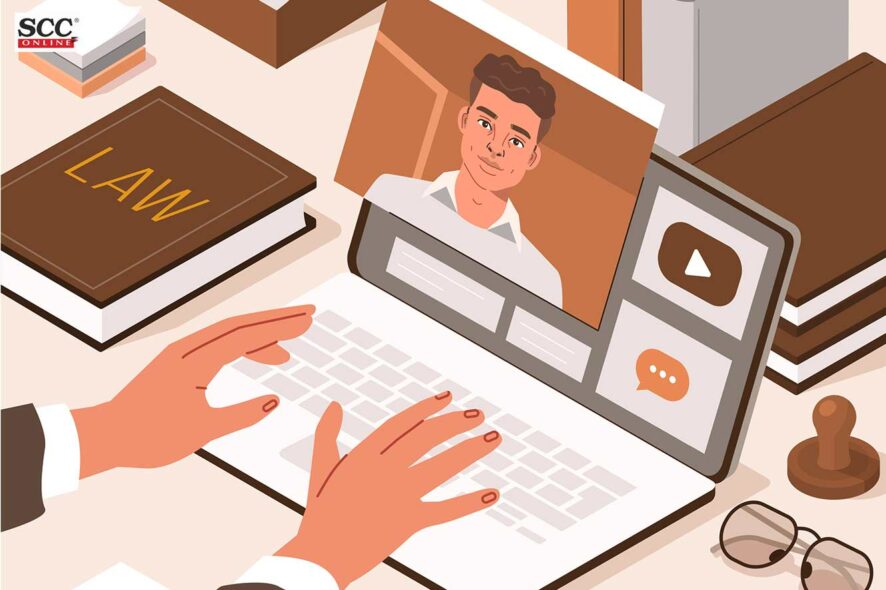District Court: The Court of Devanshu Sajlan, MM, NI Act-05/(West)/Delhi, allowed a mutual application moved on behalf of the parties for the recording of evidence through video conferencing.
Noting the fact that the matter is a ‘5-year-old’ matter, both the counsels mutually submitted that they wish to proceed with the matter and conduct evidence through VC.
Trial Court stated that both the parties were mutually willing in recording the evidence through VC, hence mutual oral application moved on behalf of the parties was allowed and the matter was directed to be listed for the recording of evidence through VC in terms of the following directions:
(i) An audio-visual recording of the examination of the complainant shall be preserved. An encrypted master copy with hash value shall be retained as a part of the record.
(ii) The evidence shall be transcribed through the mode of ‘screen sharing option’ on Cisco Webex, so that both the parties and their counsels can follow/ read the transcription in real time.
(iii) Upon the conclusion of the transcription of the cross-examination of the complainant, the complainant shall be provided with a soft copy of the transcript (bearing the digital signature of the undersigned court) through the official email- id of the court, and the complainant shall be required to affix his signature on the transcript after taking a print-out of the same.
(iv) After affixing his signature on the printed copy of the transcript, the complainant shall be required to send a scanned copy of the same on the official email-id of the court. The signed transcript will form part of the record of the judicial proceedings.
(v) Due to the present situation of COVID-19 pandemic, both parties are in agreement that it is not advisable to depute a ‘coordinator’ at the place from where the complainant shall appear for the recording of his evidence.
(vi) However, in order to prevent unnecessary tutoring or prompting, learned counsel for the complainant has submitted that he shall ensure that the complainant appears for the recording of his evidence through VC from his home; and not from the office premises/ chamber of the learned counsel for the complainant.
(vii) The complainant shall not use mobile phone/ any communication device while his evidence is being recorded.
(viii) Further, the complainant shall ensure that he has a proper internet connection so that there are no disruptions while recording his evidence.
(ix) While all endeavours shall be made to record evidence through VC, the court is cognizant of the fact that internet connectivity issues can be taken as an excuse for not answering questions put by the learned counsel to the witness and to indulge in witness prompting. Accordingly, in a scenario where the VC is disrupted during the recording of evidence, recording of evidence through VC may be discontinued and the matter would be adjourned if it appears that the witness/ complainant is deliberately disconnecting his internet connection.
[Kanwal Nain Singh Mokha v. Rekha Khurana, CC No. 1924 of 2016, decided on 26-06-2021]
Read the Summary of Videoconferencing Rules notified on 1-06-2020 by the Delhi High Court
The Rules are divided into 5 Chapters with 2 Schedules.
First Chapter contains the definitions.
In Chapter 2, the General Principles have been laid down which are under the following heads mainly:
- General Principles Governing Video Conferencing
- Facilities recommended for Video Conferencing
- Preparatory Arrangements
Chapter 3, consists of the Procedure for Video Conferencing, which is laid down under the following heads:
- Application for Appearance, Evidence and Submission by Video Conferencing
- Service of Summons
- Examinations of Persons
- Exhibiting or Showing Documents to witness or accused at a remote point.
- Ensuring Seamless Video Conferencing
- Judicial remand, the framing of charge, the examination of accused and Proceedings under Section 164 CrPC
Chapter 4 is all about the General Procedure for conducting Video Conferencing. Following heads cover the said procedure:
- Costs of Video Conferencing
- Conduct of Proceedings
- Access to legal Aid Clinics/Camps/Lok Adalat’s/Jail Adalat’s
- Allowing persons who are not parties to the case to view the proceedings
Chapter 5 is the Miscellaneous Chapter with the following heads:
- Reference to Words and Expressions
- Power to Relax
- Residual Provisions
Schedule I has pointers regarding the attire of the Advocates, Police Officials, Presiding Judge, Judicial Officers and Court Staff; Protocol, Remote point, etc.
Schedule II is with respect to the “Request Form for Video Conferencing”.
Read the detailed Rules here: NotificationFile_ULDC4UVQWZ9






